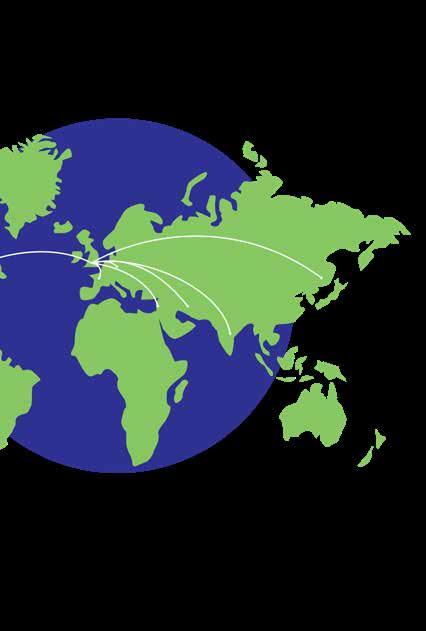
9 minute read
Doaa Shabbir Socialism, Indigenous liberation, and climate justice
Doaa Shabbir, PPE at Lady Margaret Hall
Advertisement
The scope of the climate crisis, and the threat it poses to our landscapes and livelihoods globally, has been well and firmly established. So too has the culpability of capitalism coming, as it does, into the natural world dripping blood and dirt from every pore. For indigenous populations especially, who are often at the forefront of resistance and resilience, climate change means the rampant destruction of their communities, the upheaval of food sources, and severe damages to health and wellbeing. Socialism, indigenous liberation, and climate justice must all inform one another in the plan for a way out, centring the shifting of land control and people’s organisation of development and resource extraction in their communities. Reflection on the situation at hand presents an opportunity to confront our relationship with the earth and nature, the balance of which indigenous communities have deeply honoured and upheld for centuries. The immediacy of the crisis necessitates a revolutionary roadmap; the actualisation of which will come to be just as certain as the crisis itself.
Amongst the growing acknowledgement of capitalism’s inability to solve the climate crisis, and of its active role in the origins and perpetuation of climate devastation, is increasing recognition of the insufficiency of liberal institutions to answer the crisis in terms of environmental justice. For example, the United Nations Framework Convention on Climate Change’s Paris Agreement doesn’t feature discussion of climate debt or climate reparations, despite established inequalities around carbon emissions, as a result of uneven processes of capitalist development and imperial international relations. Furthermore, considering the contemporary background of economic stagnation, heavy corporate influence and the long-established power of fossil fuel interests over political systems, the carbon space being left to each country to manage has meant the agreement has already been, in practice, dismissed. Largely, the ruling class’ approach has been to resume on a ‘business as usual’ path despite the crisis at hand [1]. The Paris Agreement also fails to stand up to the scale of the challenge we face from a geographical standpoint; the 2°C threshold can not act as a protective barrier. Studies on tipping points display that under a 2°C change, eighteen out of thirty-seven abrupt changes predicted by climate scientists would still happen [2]. For vulnerable nations contributing under 2% of current global GHG emissions, this target could mean catastrophic consequences.
Marx considers environmental crises to be crises of capital accumulation, rooted in imbalances between the material requirements of capital and the natural conditions under which raw materials are produced. Capitalist production, therefore, is simply a process of developing the techniques of the social process of production whilst at the same time undermining the original sources of all wealth - the worker and the soil. This analysis, however, also suggests that a competitive approach towards ‘reducing, reusing, and recycling’ still operates in the context of a system seeking to increase labour productivity through mass processing materials and energy into commodities. Under capitalist competition, lowering an enterprise’s private production costs per commo-
dity produced this way brings productivity gains, thus allowing enterprises surplus profits or an increased market share [3]. Therefore, we can observe that capital’s hunger for material and energy doesn’t always take an explicitly anti-ecological form; even where it presents itself as mitigating the crisis which it itself caused, capitalism can still find itself a place to gain, profit, and exert itself. Although liberalism may purport itself as proposing a solution to the climate crisis, it cannot answer to the immediacy of the situation we face.
Viewing imperialism as the highest level of capitalism, we see that the implication of the modern development and expansion of capitalism through colonialism and new imperialism has had a significant hand in the climate crisis, and also outlines the reasons why we need not just environmental recovery, but justice as well. We can see this particularly in the dimension of the oppression of indigenous peoples by capitalist entities. In Prison of Grass, Howard Adams, a Metis Indigenous activist, discussed how dispossession is caused by colonialism, capitalism, and the rise of class society. From there, he argues how racism against Indigenous peoples was first rooted in colonial regimes as the capitalist class needed a pool of labourers, disconnected from their traditional land and collective means of survival, who could be exploited for profit [4]. The theft of Indigenous lands played an essential role in the accumulation of capital in North America. In Canada, for example, John A. Macdonald deliberately starved thousands of Indigenous people to protect profits and clear a path for the Canadian Pacific Railway by ordering officials to withhold food rations from First Nations until they moved to designated reserves away from the railway’s path. Faced with starvation, First Nations were trapped on reserves which they could not leave without government agent’s permission [5]. Canadian capitalist society was developed in the same dialectical process as First Nations were deprived.
To plan is to control, and to control is to own. As long as the capitalist class maintains ownership of the means of production, production and energy extraction will continue at the expense of society, Indigenous rights, and the environment. Native Americans were continually poisoned by uranium mine tailings in the abandoned mines on and around reservations, the contaminated water caused by the mines created forced displacement, and assimilation over hundreds of years disrupted traditional food systems leading to chronic health problems and lower life expectancies amongst Native American and Native Hawaiian communities. Foreign invasion and military occupation in Hawaii rendered large areas of land not only off limits to Native Hawaiians but uninhabitable for generations following [6]. In this sense, ownership and land are both relationships and instruments of power and control. With the implementation of the Peasant Farming Policy in Canada, Indigenous farmland was divided and allocated into 40-acre parcels of land to encourage private property and undermine collective spirit. Once parcels were distributed, the ‘unused’ lands were sold, further reducing the size of the reserves [5]. As this encouraged an increased intensity of capitalist agriculture, speeding up resource
Howard Adams speaking at University of CaliforniaDavis, 1980

Left: World People's Conference on Climate Change and the Rights of Mother Earth, 2010; Right: the Wiphala flag, which represents the native people of the Andes region depletion, material oppression of Indigenous peoples went hand in hand with the environmental degradation of their communities. We also see this from a militaristic perspective; Diné land and the Four Corners area has long been used as a ‘sacrifice zone’ for the U.S. government and corporations as part of wider war-driven imperialist endeavours.
Adams ultimately proposes a vision for how to achieve a national liberation struggle (alongside broader class struggle): through recognising that “the oppression of the Native people cannot be completely eliminated without eliminating capitalism itself”. He highlights that the success of the Native movement is grounded in its ability to develop a radical thrust, and to centre mobilisation around local community struggles [4]. Marx saw the only universal reality of the human condition as being that “man must live from nature, i.e., nature is his body, and he must maintain a continuing dialogue with it if he is not to die” [7]. In 2010, over 20,000 delegates, mostly from Andean countries of Latin America with very substantial Indigenous representation, participated in the World People’s Conference on Climate Change and the Rights of Mother Earth in Cochabamba, a city which had recently seen success in struggles against water privatisation. The resolution states that “humanity confronts a great dilemma: to continue on the path of capitalism”, characterised as a system requiring “a powerful military industry for its processes of accumulation and imposition of control over territories and natural resources”, or to choose “the path of harmony with nature and respect for life”. Observing that “for there to be balance with nature there must first be equity amongst human beings”, it calls for a new system which can act as a paradigm for future mobilisation in the South linking socialism and ecology, peasant and Indigenous struggles, and taking responsibility for both the survival of local populations and global concerns. It concludes that Indigenous peoples’ ancestral practices recognising humanity's indivisible and interdependent relationship with the Earth as well as these communities’ resistance against their destruction have a “vital importance for humanity as a whole” [8].
This highlights that just as there can be no climate justice that isn’t socialist, there can be no socialism that is not international and decolonial. Ultimately, class is a question of power and
control, about which a series of questions can be posed regarding who controls resources, and whether the worker has control over their worksite and environment. Public ownership and democratic planning can help to coordinate establishment and expansion of free public transport networks, the transition to renewable energy, mass retrofitting of homes, and mass afforestation and rewilding programmes [9]. As Edward Said highlights in Culture and Imperialism, the main battle in imperialism is over land: over who owns it, who has the right to settle and work on it, who seizes it and who wins it back, and who plans its future [10]. The liberation of Indigenous peoples must mean that Indigenous peoples can control the fate of their communities themselves, so that they have direct control over economic activity and development on their territory, including the pace and methods of resource extraction, without the constraint of the profit motive which often exploits these resources and the environments they come from. Regarding the global environmental future, and that of indigenous communities in particular, the words of Glen Coulthard in his article for the Indigenous Nationhood Movement ring especially true: “for our nations to live; capitalism must die” [11].
[1] V. Satgar. “The Climate Crisis: South African and Global Democratic Eco-Socialist Alternatives”, Johannesburg: Wits University Press, 2018 [2] S. Drijfhout. “What climate ‘tipping points’ are – and how they could suddenly change our planet”, The Conversation, 2015. Online: https://theconversation.com/what-climate-tipping-points-are-and-how-theycould-suddenly-change-our-planet-49405 [3] P. Burkett. “Marx and Nature: A Red And Green Perspective”, New York: St Martin’s Press, 1956 [4] R. Johnson. “Socialism, solidarity and the indigenous struggle”, International Socialist Organization, 2018. https://socialistworker.org/2018/09/12/socialism-solidarity-and-the-indigenous-struggle [5] Fightback. “Canada: indigenous struggle and the fight for socialism – revolution, not reconciliation!”, 2020, https://www. marxist.com/canada-indigenous-struggle.htm [6] D. Gilio-Whitaker. “As Long as Grass Grows: The Indigenous Fight for Environmental Justice”, Boston: Beacon Press, 2019 [7] H. Holleman. “Dust Bowls of Empire: Imperialism, Environmental Politics, and the Injustice of ‘Green’ Capitalism”, New York: Yale University Press, 2018 [8] M. Lowy. “Ecosocialism: A Radical Alternative To Capitalist Catastrophe”, Chicago: Haymarket Books, 2015 [9] J. Molyneux. “Socialism is the only realistic solution to climate change”, Climate and Capitalism, 2019. https://climateandcapitalism.com/2019/10/01/why-socialism-is-the-only-realistic-solution-to-climate-change/ [10] E. Said. “Culture and Imperialism”, New York: Knopf, 1994 [11] G. Coulthard. “For Our Nations to Live, Capitalism Must Die”, Unsettling America, 2013. https://unsettlingamerica.wordpress. com/2013/11/05/for-our-nations-to-live-capitalism-must-die/










